View in other NatureServe Network Field Guides
NatureServe
Montana
Utah
Wyoming
Idaho
Wisconsin
British Columbia
South Carolina
Yukon
California
New York
Kalm's Lobelia - Lobelia kalmii
State Rank Reason (see State Rank above)
Lobelia kalmii occurs in fens and other high-organic wetlands in northwest, central, and northeast Montana. Approximately 34 observations have been made at about 23 unique locations. The central Montana location has not been observed since 1934. Current observation, population size, and threat information at documented sites is needed.
- Details on Status Ranking and Review
Range Extent
ScoreF - 20,000-200,000 sq km (~8,000-80,000 sq mi)
Area of Occupancy
ScoreD - 6-25 4-km2 grid cells
Number of Populations
ScoreC - 21 - 80
Number of Occurrences or Percent Area with Good Viability / Ecological Integrity
ScoreC - Few (4-12) occurrences with excellent or good viability or ecological integrity
Environmental Specificity
ScoreA - Very narrow. Specialist or community with key requirements scarce
Threats
ScoreD - Low
CommentNo known threats.
General Description
Stems erect, usually simple, 10–40 cm. Herbage glabrate. Basal leaves petiolate, spatulate, entire to obscurely dentate, 1–3 cm long. Stem leaves becoming linear-lanceolate, 1–4 cm long. Inflorescence of <10 flowers; pedicels bracteate. Flowers: sepals lanceolate, 2–3 mm long; corolla 5–10 mm long, blue, whitish at top of the tube. Capsule obconic, 4–7mm long (
Lesica et al. 2012. Manual of Montana Vascular Plants. BRIT Press. Fort Worth, TX).
Lobelia is named for the botanist Mathias de L'Obel (Morley 1970). In 1570, Mathias along with Pierre Pena published the first book that arranged plants by leaf characteristics, which represented a major advancement in the study of plant classification (Morley 1970).
Diagnostic Characteristics
Plants slender rarely over 4 dm tall, flowers 7-16 mm long, pedicels with a pair of subopposite bractioles; corolla not normally fenestrate, base of lower lip smooth; capsule ovoid, seeds rough tuberculate.
Species Range
Montana Range
Range Descriptions
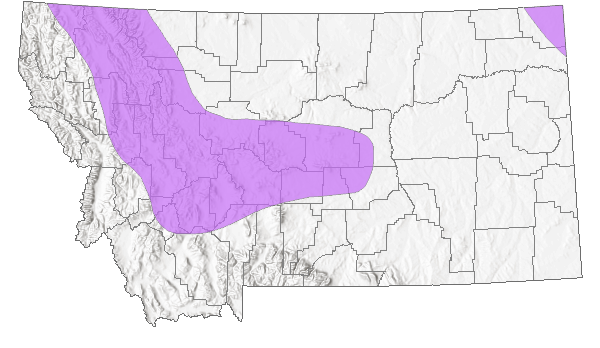
 Native
Native
Range Comments
YT to NL south to WA, MT, MN and PA (Lesica et al. 2012. Manual of Montana Vascular Plants. BRIT Press. Fort Worth, TX).
Observations in Montana Natural Heritage Program Database
Number of Observations: 39
(Click on the following maps and charts to see full sized version)
Map Help and Descriptions
Relative Density
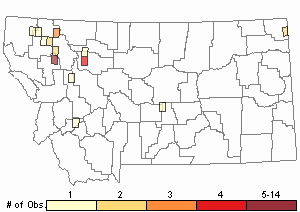
Recency
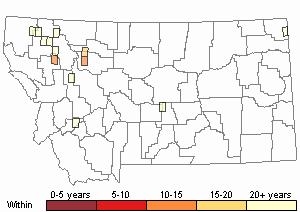
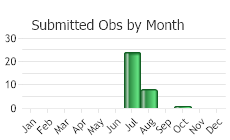
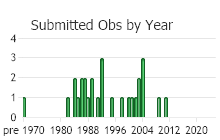
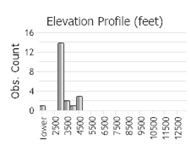 (Observations spanning multiple months or years are excluded from time charts)
(Observations spanning multiple months or years are excluded from time charts)
Habitat
National Vegetation Classification System Groups Associated with this Species
Wetland and Riparian
Peatland
Wet Meadow and Marsh
Ecology
POLLINATORS The following animal species have been reported as pollinators of this plant species or its genus where their geographic ranges overlap:
Bombus fervidus,
Bombus pensylvanicus, and
Bombus griseocollis (Colla and Dumesh 2010).
Stewardship Responsibility
Threats or Limiting Factors
STATE THREAT SCORE REASON
Threat impact not assigned because threats are not known (MTNHP Threat Assessment 2021).
References
- Literature Cited AboveLegend:
 View Online Publication
View Online Publication Britton, N. L. and A. B. Brown. 1913. An Illustrated Flora of the Northern United States, Canada, and the British Possessions. 2nd Edition in 3 Volumes. New York, NY: Charles Scribner's Sons. B13BRI01PAUS.
Britton, N. L. and A. B. Brown. 1913. An Illustrated Flora of the Northern United States, Canada, and the British Possessions. 2nd Edition in 3 Volumes. New York, NY: Charles Scribner's Sons. B13BRI01PAUS. Colla, S.R. and S. Dumesh. 2010. The bumble bees of southern Ontario: notes on natural history and distribution. Journal of the Entomological Society of Ontario 141:39-68.
Colla, S.R. and S. Dumesh. 2010. The bumble bees of southern Ontario: notes on natural history and distribution. Journal of the Entomological Society of Ontario 141:39-68. Hitchcock, C.L., A. Cronquist, M. Ownbey and J.W. Thompson. 1959. Vascular plants of the Pacific Northwest, Part 4. Ericaceae through Campanulaceae. Seattle, WA and London, UK: University of Washington Press. 510 p.
Hitchcock, C.L., A. Cronquist, M. Ownbey and J.W. Thompson. 1959. Vascular plants of the Pacific Northwest, Part 4. Ericaceae through Campanulaceae. Seattle, WA and London, UK: University of Washington Press. 510 p. Lesica, P., M.T. Lavin, and P.F. Stickney. 2012. Manual of Montana Vascular Plants. Fort Worth, TX: BRIT Press. viii + 771 p.
Lesica, P., M.T. Lavin, and P.F. Stickney. 2012. Manual of Montana Vascular Plants. Fort Worth, TX: BRIT Press. viii + 771 p. Morely, Brian D. 1970. Wild Flowers of the World. Paintings by Barbara Everard. First American Edition. Rainbird Reference Books Limited, London, United Kingdom.
Morely, Brian D. 1970. Wild Flowers of the World. Paintings by Barbara Everard. First American Edition. Rainbird Reference Books Limited, London, United Kingdom. MTNHP Threat Assessment. 2021. State Threat Score Assignment and Assessment of Reported Threats from 2006 to 2021 for State-listed Vascular Plants. Botany Program, Montana Natural Heritage Program, Helena, Montana.
MTNHP Threat Assessment. 2021. State Threat Score Assignment and Assessment of Reported Threats from 2006 to 2021 for State-listed Vascular Plants. Botany Program, Montana Natural Heritage Program, Helena, Montana.
- Additional ReferencesLegend:
 View Online Publication
View Online Publication
Do you know of a citation we're missing? Fernald, M. L. 1950. Gray's manual of botany. Eighth edition. A handbook of the flowering plants and ferns of the central and northeastern United States and Adjacent Canada. American Book Co., New York.
Fernald, M. L. 1950. Gray's manual of botany. Eighth edition. A handbook of the flowering plants and ferns of the central and northeastern United States and Adjacent Canada. American Book Co., New York. Gleason, H. A., and A. Cronquist. 1991. Manual of vascular plants of northeastern United States and adjacent Canada. New York Botanical Garden, Bronx, NY. 910 pp.
Gleason, H. A., and A. Cronquist. 1991. Manual of vascular plants of northeastern United States and adjacent Canada. New York Botanical Garden, Bronx, NY. 910 pp. Gleason, H.A. 1952. New Britton & Brown. Illustrated Flora. Lancaster Press Inc. Lancaster, Pa. B52GLE01PAUS
Gleason, H.A. 1952. New Britton & Brown. Illustrated Flora. Lancaster Press Inc. Lancaster, Pa. B52GLE01PAUS Heidel, B.L., S.V. Cooper and C. Jean. 2000. Plant species of special concern and plant associations of Sheridan County, Montana. Report to U.S. Fish and Wildlife Service. Montana Natural Heritage Program, Helena, Montana. 96 p.
Heidel, B.L., S.V. Cooper and C. Jean. 2000. Plant species of special concern and plant associations of Sheridan County, Montana. Report to U.S. Fish and Wildlife Service. Montana Natural Heritage Program, Helena, Montana. 96 p. Lesica, P., M.T. Lavin, and P.F. Stickney. 2022. Manual of Montana Vascular Plants, Second Edition. Fort Worth, TX: BRIT Press. viii + 779 p.
Lesica, P., M.T. Lavin, and P.F. Stickney. 2022. Manual of Montana Vascular Plants, Second Edition. Fort Worth, TX: BRIT Press. viii + 779 p. Linnaeus, C. 1753. Species Plantarum. A fascimile of the first edition printed by Adlard & Son, Bartholomew Press, Dorking, Great Britain. 2 vol.
Linnaeus, C. 1753. Species Plantarum. A fascimile of the first edition printed by Adlard & Son, Bartholomew Press, Dorking, Great Britain. 2 vol. McVaugh, R. 1936. Studies in the Taxonomy and Distribution of the Eastern North American Species of Lobelia. Rhodora 38:241-263, 276-298, 305-329, 346-362. A36MCV01PAUS.
McVaugh, R. 1936. Studies in the Taxonomy and Distribution of the Eastern North American Species of Lobelia. Rhodora 38:241-263, 276-298, 305-329, 346-362. A36MCV01PAUS. Weishaupt, C.G. 1971. Vascular Plants of Ohio, Third Ed. Kendall/Hunt Publishing Co. Dubuque, Iowa. B71WEI01PAUS
Weishaupt, C.G. 1971. Vascular Plants of Ohio, Third Ed. Kendall/Hunt Publishing Co. Dubuque, Iowa. B71WEI01PAUS
- Web Search Engines for Articles on "Kalm's Lobelia"





